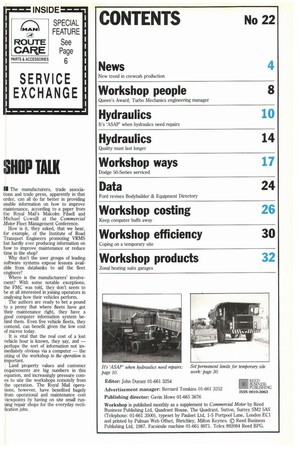SHOP TALK
Page 115

If you've noticed an error in this article please click here to report it so we can fix it.
IN The manufacturers, trade associations and trade press, apparently in that order, can all do far better in providing usable information on how to improve maintenance, according to a paper from the Royal Mail's Malcolm Filsell and Michael Cowsill at the Commercial Motor Fleet Management Conference.
How is it, they asked, that we hear, for example, of the Institute of Road Transport Engineers promoting VRMS but hardly ever producing information on how to improve maintenance or reduce time in the shop?
Why don't the user groups of leading software systems expose lessons available from databanks to aid the fleet engineer?
Where is the manufacturers' involvement? With some notable exceptions, the FMC was told, they don't seem to be at all interested in joining operators in analysing how their vehicles perform.
The authors are ready to bet a pound to a penny that where fleets have got their maintenance right, they have a good computer information system behind them. Even five vehicle fleets, they contend, can benefit given the low cost of micros today.
It is vital that the real cost of a lost vehicle hour is known, they say, and — perhaps the sort of information not immediately obvious via a computer — the siting of the workshop to the operation is important.
Land property values and customer requirements are big numbers in this equation, and increasingly pressure comes to site the workshops remotely from the operation. The Royal Mail operations, however, have benefited hugely from operational and maintenance cost viewpoints by having on site small running repair shops for the everyday rectification jobs.




















































































































































